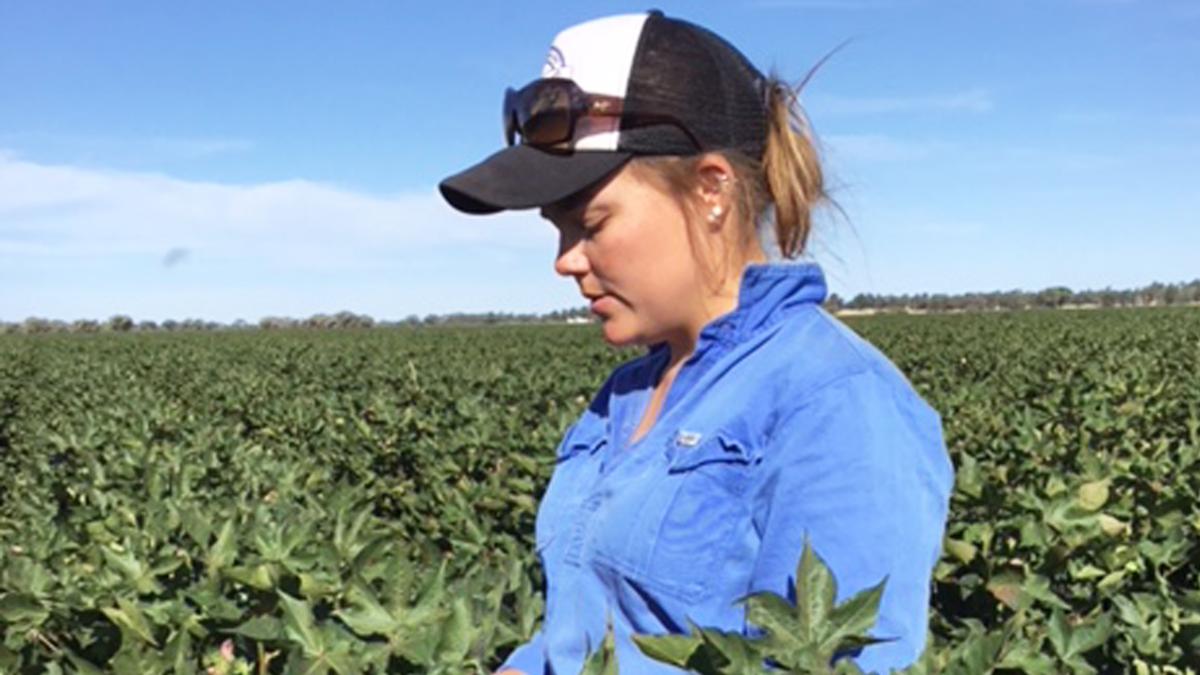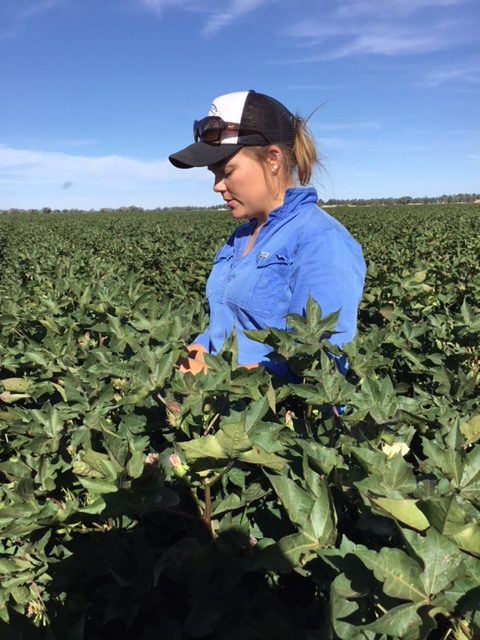
The farming industry has been crying out for more people to take up harvesting jobs, after the pandemic and a loss of backpackers created huge job shortages. But despite promises of high earnings, farms are struggling to entice Aussies to pick up the work.
So what does working on a farm actually entail?
It’s a pretty decent lifestyle, according to Emma Ayliffe, a 29-year-old farmer and agronomist researcher in central NSW (who also happens to be one of our 27 Pedestrians.).
Her job involves working with farmers to work out what’s going well with crops, and what isn’t.

Emma (pictured) checking cotton on a farm in NSW. Photo: Supplied.
“So basically a crop doctor,” she told PEDESTRIAN.TV.
She lives in Lake Cargelligo, a town about an hour east of Condobolin with a population of less than 2,000 people.
It may seem like a long way away when you’re used to the big city, but Emma loves the job and says that during a pandemic, being on an isolated farm allows a lot more freedom of movement.

Photo: Instagram / Emma Ayliffe.
“I moved well over 1,000kms away from my family to end up where I am today,” she said.
“You’ll meet the most amazing people and see the most amazing sites, and be a part of an industry that’s really progressive and really cool. You’ll see the amazing things that are happening in rural and regional Australia.”

Image: Instagram/ Emma Ayliffe
Before the pandemic hit, there were around 140,000 backpackers and 7,000 Pacific Islanders in Australia with working visas. Those numbers have now slumped to 85,000, with the National Farmers Federation (NFF) estimating there is shortage of approximately 26,000 harvesting jobs.
To help with the shortfall, the Federal Government has promised $6,000 to any Aussie worker relocating to take up short-term (a.k.a. seasonal) agricultural work.
“So the idea there is that they can have sort of a working holiday,” Ben Rogers from the NFF told P.TV.
“They go and work on a farm and the government pays the cost of the accommodation and the travel.”
According to Rogers, these sorts of jobs involve unskilled labor, picking and packing, and could see you earning around $1,000 per week.
However, several reports have rubbished the claims of high earnings for agricultural work – or any wage at all.
A report published in The New Daily claimed some labour-hire companies specifically avoid hiring Australian citizens, advertising for “working holiday makers only”.
Another report, published by the ABC, highlighted the case of a young woman who worked two months on a farm, and had just $70 to her name.
Rogers said it’s crucial to find jobs through reputable websites, like the Harvest Trail or the NFF FarmHub.
Although Emma did concede that some farms do try to take advantage of workers, she reckons in most cases workers are well looked after, with employers providing accommodation and flexible working hours.
“If you’re a morning person, you are more than welcome to start at five and knock off at three,” she said.
“If you don’t like getting up in the morning, you’re more than welcome to start at nine and clock off at six.”

Emma (pictured) irrigating in Lake Cargelligo.
So why is no one jumping at these jobs?
Emma reckons it comes down to two things: a misconception of farm work, and an unwillingness for change.
“I think there’s a bit of misinformation out there about what is actually available and what is on offer out here,” Emma said.
“And people overlook the jobs just because of where they are and not wanting to leave their current location.”
For Aussies graduating Year 12 who were otherwise planning an overseas gap year, picking up a rural job might be the next best thing (and make them eligible for Youth Allowance quicker).
“If people are keen there are a lot of opportunities with a lot of industry stuff. The cotton industry does the Cotton Gap program for when you finish Year 12, and they’ll place you with really amazing and progressive farmers,” Emma said.
“It gives them an opportunity to get out on the farm and earn some good money in that year between school and uni.”
Although there might be a big apprehension for signing up for farm work – particularly if you’ve never been one one in your life – Emma said there’s nothing better than diving in head first.
“The best things in life are always achieved when you’re scared,” she said.
“A lot of the best life experiences you have are when you’re uncomfortable and doing something you’re nervous about.”
If you want to find out more, head to the Harvest Trail ,the NFF Farm Hub, or the Australian Government’s agricultural job search site.



